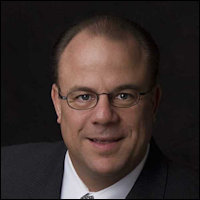
Doug Muir
by James A. Bacon
In light of the departure of adjunct faculty member Doug Muir from his University of Virginia teaching positions after making controversial statements about the Black Lives Matter movement on Facebook, the question has arisen: Does UVa have the right to fire employees for objectionable speech? (For background, see “Safe Spaces: Not Just for Classrooms Any More.”)
First, let me clear that the exact circumstances of Muir’s departure from UVa are murky. All we know from the public record is a statement by Craig E. Benson, dean of the engineering school where Muir taught, that “Mr. Muir has agreed to take leave.” One can deduce from that comment that the university wanted him to leave but sought a voluntary departure. That minuet, however it transpired, may not meet the legal definition of a firing. But judging from the context of the controversy, it looks like UVa exercised some arm-twisting to effect Muir’s departure.
Virginia is an employment-at-will state, which gives employers wide latitude in terminating employees for whatever reason the boss man desires. However, employment-at-will is not an absolute doctrine. If employers and employees signed an employment contract, for instance, the contract has primacy. Furthermore, the rules for public employees — and the University of Virginia is a public entity governed in many ways by state law — can differ from the rules for the employees of private companies.
I searched the Internet for any documents or guidelines that UVa might have published explicitly laying out the university’s policies toward the use of social media. If the university had explicitly warned employees that they could be held accountable for private comments (made as private individuals, not as representatives of the university) on outside (non-university) social media, then Muir doesn’t deserve much sympathy. Conversely, if the university had no formal policy, then one can ask whether the university was being arbitrary and capricious in seeking Muir’s departure.
A number of documents set guidelines for the use of university-owned or -sponsored social media, and some address the use of outside resources like Facebook to advance university goals and objectives. None of those, however, touch upon an employee’s rights to express political opinions in a non-university forum. Indeed, I could find no university-specific documents outlining expectations for employee behavior. I have submitted email and voicemail requests to UVa’s media relations department to provide any such documents, if they exist, but have not yet heard back.
The best discussion I found on the general subject is the “Handbook of Free Speech Issues,” published by the California State University’s office of the general counsel in 2009. It is worth quoting:
Because CSU employees are “public employees” they have greater rights than private sector employees to voice themselves in the work place. There are four relevant types of protected speech: labor-related speech, political speech, religious speech and matters that are of concern to the public at large.
Imposing discipline or taking an adverse work-related action against an employee for engaging in any protected form of speech is clearly prohibited, as is threatening or intimidating an employee in order to prevent them from engaging in protected speech. …
Campuses may not prohibit or take any adverse action based on an employee’s personal political affiliation, activity or beliefs.
Muir’s departure from the university, which left administrators scrambling to find someone to pick up his classes, came after his comments stoked a public furor. Charlottesville Mayor Wes Bellamy encouraged people to boycott a restaurant owned by Muir’s wife and wrote, “I implore the Darden School of Business … to address this issue immediately.” NAACP representative Rick Turner told WVIR-TV, “Not only should they drop his class, the university should get rid of him, if they can, They should not allow him to stand in front of students again.”
According to the UVa “Terms and Conditions of University Staff Employment,” employees can be terminated for just cause. “Causes for suspension or termination shall include but are not limited to: unethical or unlawful conduct, misappropriation of funds, misconduct that interferes with the capacity of the employee to perform effectively, falsification of credentials or experience, and failure or refusal to comply with applicable University policies, rules and regulations.”
It would be interesting to know which of these causes UVa might consider to be grounds for nudging Muir into unemployment. Because the Muir matter is a personnel issue, UVa is within its rights to withhold comment. But if the administration doesn’t explain itself better, this sure looks like a case of buckling under pressure to suppress unpopular views.
Update: Muir has publicly apologized for his Facebook post and will resume teaching next week. The circumstances behind his “leave” still remain murky, but it was not a firing, and my deduction above that the university nudged him into leaving is not supported by the evidence. University spokesman Anthony P. DeBruyn tells me that “the University did not take disciplinary action against Mr. Muir” and that “he volunteered to go on leave for a short period.”
Still, the bigger question of this post remains: What right does a public university have to fire an employee who expressed an unpopular but personal opinion in social media? Sooner or later, that issue will arise, if not at UVa, then at another Virginia university.


